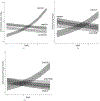Associations between self-monitoring and weight change in behavioral weight loss interventions - PubMed (original) (raw)
. 2019 Dec;38(12):1128-1136.
doi: 10.1037/hea0000800. Epub 2019 Sep 26.
Affiliations
- PMID: 31556659
- PMCID: PMC6861632
- DOI: 10.1037/hea0000800
Associations between self-monitoring and weight change in behavioral weight loss interventions
Stephanie P Goldstein et al. Health Psychol. 2019 Dec.
Abstract
Objective: The current study is a secondary analysis of the Live SMART trial, a randomized controlled trial comparing a behavioral weight loss (BWL) condition delivered via smartphone (SMART) to a group-based BWL condition (GROUP) and a control condition (CONTROL). Given the established importance of self-monitoring for weight loss, the aims were to evaluate bidirectional associations between adherence to self-monitoring and weight change and to examine the moderating effect of treatment condition on these associations.
Method: Adults with overweight/obesity (n = 276; 83% women; 92.8% White; Mage = 55.1 years; Mbody mass index = 35.2 kg/m2) were instructed to self-monitor dietary intake, daily weight, and physical activity minutes via paper diaries in GROUP and CONTROL and via a smartphone application in SMART. All participants were weighed monthly at the research center. Adherence to self-monitoring was assessed via examination of self-monitoring records.
Results: Generalized linear mixed models revealed that adherence to self-monitoring of dietary intake, self-weighing, and physical activity for each month was associated with weight change throughout that month, such that increased frequency of self-monitoring led to greater weight loss (ps < .001). For the GROUP condition only, poorer weight losses in 1 month were prospectively associated with poor adherence to self-monitoring the following month (ps ≤ .01).
Conclusions: Results provide evidence of a bidirectional association between self-monitoring and weight change. Better self-monitoring was consistently associated with better weight loss across intervention and tracking modalities. Poorer weight loss was prospectively associated with poorer self-monitoring in group treatment, suggesting that social influences could drive adherence in this form of treatment. (PsycINFO Database Record (c) 2019 APA, all rights reserved).
Trial registration: ClinicalTrials.gov NCT01724632.
Conflict of interest statement
Disclosure: The authors declare no conflict of interest.
Figures
Figure 1.
Percentage of Missing Data: Self-monitoring and Percent Weight Loss Notes: Missing self-monitoring data are representative of records with no days of monitoring or records not turned in; Percent weight loss is representative of attendance at clinic visits (i.e., a value is missing if the participant did not attend the current and/or previous clinic visit for that particular month); Adherence to self-monitoring across conditions can be found in the primary outcomes paper (Thomas et al., 2019).
Figure 2.
Prospective association between adherence to self-monitoring and %WL across treatment conditions. In (a), adherence to self-monitoring dietary intake is pictured, followed by adherence to self-monitoring weight (b) and physical activity (c). Note: Greater %WL is indicative of more weight loss
Similar articles
- Weight-Related Information Avoidance Prospectively Predicts Poorer Self-Monitoring and Engagement in a Behavioral Weight Loss Intervention.
Schumacher LM, Martinelli MK, Convertino AD, Forman EM, Butryn ML. Schumacher LM, et al. Ann Behav Med. 2021 Mar 16;55(2):103-111. doi: 10.1093/abm/kaaa034. Ann Behav Med. 2021. PMID: 32491152 Free PMC article. Clinical Trial. - Comparison of Smartphone-Based Behavioral Obesity Treatment With Gold Standard Group Treatment and Control: A Randomized Trial.
Thomas JG, Bond DS, Raynor HA, Papandonatos GD, Wing RR. Thomas JG, et al. Obesity (Silver Spring). 2019 Apr;27(4):572-580. doi: 10.1002/oby.22410. Epub 2019 Feb 19. Obesity (Silver Spring). 2019. PMID: 30779333 Free PMC article. Clinical Trial. - Using mHealth technology to enhance self-monitoring for weight loss: a randomized trial.
Burke LE, Styn MA, Sereika SM, Conroy MB, Ye L, Glanz K, Sevick MA, Ewing LJ. Burke LE, et al. Am J Prev Med. 2012 Jul;43(1):20-6. doi: 10.1016/j.amepre.2012.03.016. Am J Prev Med. 2012. PMID: 22704741 Free PMC article. Clinical Trial. - Defining Adherence to Dietary Self-Monitoring Using a Mobile App: A Narrative Review.
Payne JE, Turk MT, Kalarchian MA, Pellegrini CA. Payne JE, et al. J Acad Nutr Diet. 2018 Nov;118(11):2094-2119. doi: 10.1016/j.jand.2018.05.011. Epub 2018 Aug 13. J Acad Nutr Diet. 2018. PMID: 30115555 Review. - [EFFICACY OF SELF-MONITORING IN WEIGHT LOSS: A SYSTEMATIC REVIEW OF RANDOMIZED CONTROLLED STUDIES].
Estrada Ruelas K, Bacardí-Gascon M, Jiménez-Cruz A. Estrada Ruelas K, et al. Nutr Hosp. 2015 Dec 1;32(6):2472-7. doi: 10.3305/nh.2015.32.6.9847. Nutr Hosp. 2015. PMID: 26667693 Spanish.
Cited by
- Remote Delivery of Partial Meal Replacement for Weight Loss in People Awaiting Arthroplasty.
Chimoriya R, Naylor J, Mitlehner K, Adie S, Harris I, Bell-Higgs A, Brosnahan N, Piya MK. Chimoriya R, et al. J Clin Med. 2024 May 30;13(11):3227. doi: 10.3390/jcm13113227. J Clin Med. 2024. PMID: 38892938 Free PMC article. - Behaviors and psychological states associated with transitions from regaining to losing weight.
Hayes JF, Wing RR, Unick JL, Ross KM. Hayes JF, et al. Health Psychol. 2022 Dec;41(12):938-945. doi: 10.1037/hea0001224. Epub 2022 Sep 1. Health Psychol. 2022. PMID: 36048078 Free PMC article. - Mobile health assisted self-monitoring is acceptable for supporting weight loss in rural men: a pragmatic randomized controlled feasibility trial.
Eisenhauer CM, Brito F, Kupzyk K, Yoder A, Almeida F, Beller RJ, Miller J, Hageman PA. Eisenhauer CM, et al. BMC Public Health. 2021 Aug 18;21(1):1568. doi: 10.1186/s12889-021-11618-7. BMC Public Health. 2021. PMID: 34407782 Free PMC article. Clinical Trial. - Adherence to mobile-app-based dietary self-monitoring-Impact on weight loss in adults.
Payne JE, Turk MT, Kalarchian MA, Pellegrini CA. Payne JE, et al. Obes Sci Pract. 2021 Sep 28;8(3):279-288. doi: 10.1002/osp4.566. eCollection 2022 Jun. Obes Sci Pract. 2021. PMID: 35664248 Free PMC article. - Expert opinions on reducing dietary self-monitoring burden and maintaining efficacy in weight loss programs: A Delphi study.
Krukowski RA, Harvey J, Borden J, Stansbury ML, West DS. Krukowski RA, et al. Obes Sci Pract. 2022 Jan 12;8(4):401-410. doi: 10.1002/osp4.586. eCollection 2022 Aug. Obes Sci Pract. 2022. PMID: 35949285 Free PMC article.
References
- Bandura A (1998). Health promotion from the perspective of social cognitive theory. Psychology and Health, 13(4), 623–649. doi:10.1080/08870449808407422 - DOI
- Bandura A (2011). Social Cognitive Theory (Vol. 2012).

